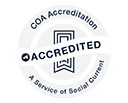Adoption and Guardianship
Governor JB Pritzker proclaims November 2025 Adoption Awareness Month
Over the last decade, more than 15,000 children got the chance they deserve to love and be loved, and to reach their fullest potential thanks to families across our state that chose to adopt through DCFS. By providing a child with a loving and permanent home, adoptive families have discovered the unique joy of making a life-changing difference to a child. It is a feeling you can't get any other way.
At the same time, the decision to add a child to your family is serious and life changing. We want to help you make sure that opening your heart and your life to a child is the right decision for the child and your family. If you choose to adopt, DCFS and our non-profit partners are committed to providing your new family with the help you need.
Adoption establishes you as a child's legal parent with all the rights and responsibilities of a child born to you. Once a child is adopted, DCFS is no longer involved in or responsible for the care, supervision or custody of the child. As an adoptive parent, you assume all rights and responsibilities to make important decisions for your child, including the right to consent to major medical care and treatment, to marriage and to enlistment in the armed services. Adoption is permanent and lifelong, and is only possible when the birth parents have voluntarily given up their parental rights or their rights are terminated by the court.
For more information about adoption, read the Birth Parent Rights and Responsibilities (DCFS Case), Birth Parent Rights and Responsibilities (Private Agency Case) and Adoptive Parent Rights and Responsibilities.
Guardianship means that the court appoints you as the child's legal guardian. It differs from adoption because the birth parents' rights do not have to be terminated. Guardianship is frequently used by relative caregivers or lifetime family friends who wish to provide a permanent home for a child while allowing the child to preserve bonds to extended family members. When you are appointed guardian, DCFS will not be involved in the care, supervision or legal custody of the child. Guardianship lasts until the child reaches the age of 18 and can be considered for children who have been living in the home of licensed relatives for a period of six consecutive months. Families becoming guardians of children in the care of DCFS may receive financial and non-financial assistance and resources.
Adoption and guardianship resources:
- Making the Adoption/Guardianship Decision booklet in English, Spanish or Polish
- Guardianship is a Path to Permanency brochure in English, Spanish or Polish
- Fill out the online interest form and a foster/adoptive parent recruiter will contact you with more information and next steps.
The KIND Act
On February 5, 2025, Governor JB Pritzker signed the Kinship in Demand (KIND) Act into law. This legislation, which took effect July 1, is an effort that Illinois DCFS and the Illinois ACLU collaborated on and creates the authority for Illinois to implement separate standards for relatives to be certified to care for related children and youth in DCFS care. DCFS has recently adopted Rules 415 to provide guidance on implementation of the new legislation.
This legislation is extremely important to DCFS and has required extensive coordinated efforts amongst systems, processes and policies. The actual certification process will commence once the new procedures and updated form components are finalized later this year.
DCFS is working expeditiously and appreciates your patience as we move forward with this transformational change to benefit children, youth and families.
The KIND Act will:
- Ensure the Illinois Department of Children and Family Services works to identify relatives as placement and visitation resources for youth in care.
- Develop standards for relative caregiver home certification.
- Promote the voices of children, youth and their family members in permanency placement.
- Increase financial supports to relative caregivers.
- Treat adoption and guardianship as equivalent permanency options if reunification is not possible.
- Develop separate standards to certify relatives who can safely care for youth in the state’s care, rather than require relatives to comply with traditional foster parent licensing requirements.
- Qualify certified relative caregivers for subsidized guardianship.
Who are the children waiting to be adopted?
Waiting children come from all across the state, from all ages and backgrounds. Many are in need of a loving home not only for themselves, but also a little brother or sister. We offer special supports to help families offer a loving home to children with medical difficulties or other special needs.
Most children waiting to be adopted are living temporarily with relatives or other foster families. Some live in larger, professionally-staffed group settings. DCFS maintains an online listing with pictures and descriptions of children in need of a loving family. Visit the Heart Gallery of Illinois to learn more.


 312-814-6800
312-814-6800